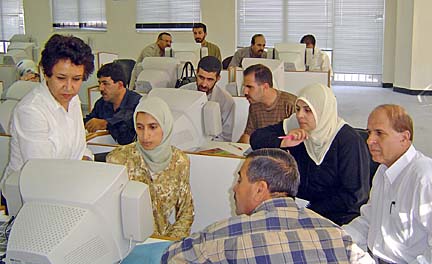

|
From Amman
to Honolulu
with love
With the help of technology,
students in Hawaii connect with
their counterparts in Jordan, and
both sides come away a little wiser
In its report last month, the 9/11 Commission recommended that the U.S. government "rebuild the scholarship, exchange and library programs that reach out to young people (in the Middle East) and offer them knowledge and hope." A recent trip to Jordan confirmed the wisdom of this recommendation.
During the first two weeks of August, I led two 6-day workshops for the Jordanian Ministry of Education in Amman. The participants were 52 educators in the World Lnks Jordan program, an initiative that began at the World Bank Institute in 1997, and evolved into a nonprofit organization that serves 200,000 educators in more than 30 countries. World Links (www.world-links.org) is "dedicated to improving educational opportunities and global understanding for youth in developing countries, through the use of technology" and the professional development of educators.
Friends and family members questioned the timing of this trip, raising concerns because Jordan borders Syria, Saudi Arabia, Israel and Iraq. However, I had personal and professional connections with the region, thanks to a teaching stint in Cairo and previous World Links workshops in the West Bank. Ultimately, though, a single conviction compelled my journey: The Middle East needs to learn more about America and America needs to learn more about the Middle East.
To facilitate an educational exchange, I arranged for participants in the World Links Jordan workshops to engage in online discussions with my students in the Interdisciplinary Master's in Education (IMED) program at the University of Hawaii. While sharing digital photos from recent trips to Molokai and the Big Island (where the IMED students live and work), it became apparent that the beaches, volcanoes and people of Hawaii were as foreign to the Jordanians as the deserts, politics and customs of Jordan were to the IMED cohort.
In addition to our ignorance of each other's geography and cultures, we also suffered a serious language barrier. The Jordanians made an heroic effort to brainstorm ideas in English for potential online learning projects with students on Molokai and the Big Island.
While promising, these exchanges were not without risk. When one of the IMED students asked why there is "so little acceptance of a Semitic people, the Jews, in the area of their historical origins," it prompted raw passions and unfortunate expressions over the Israeli occupation of the West Bank.
Although that exchange upset a number of people, it also provided an opportunity for learning. We used it to discuss the establishment of an acceptable use policy for online discussions, holding ourselves accountable for modeling appropriate discursive practices. I did not sanction anyone, nor threaten disciplinary action; instead, we negotiated a peaceful settlement, which included personal apologies and the creation of guidelines for healthy interactions on the World Wide Web, then moved on.
The theme of the workshops was the "diffusion of innovations," examining not only emerging forms of educational technology and innovative, pedagogical uses of it, but also ways of sharing innovations with colleagues. We worked collaboratively to develop Web pages and communication channels to support the integration of technology and teacher professional development throughout the Kingdom of Jordan.
Despite sluggish Internet access and draconian time constraints, we constructed the first interactive, Arabic Web site dedicated to professional development for K-12 teachers in the Middle East.
Hala Tahir, the World Links Jordan coordinator (as well as my translator and guardian angel), deserves much of the credit for this achievement. Every day, Hala and I collaborated on the introduction and facilitation of online learning activities. I would offer a few sentences in English, pause for her translation, then wait for questions before continuing our staccato, two-step dance. "I know enough Arabic to get into trouble," I told the group, "but not enough to get out of it!"
I frequently worried that I might say something offensive, something that would be misinterpreted or taken as an insult. On one occasion, a mock facial expression in reaction to a group's mediocre draft of a rubric prompted an animated discussion. I could not understand the words spoken, but body language, facial expressions and vocal inflection conveyed displeasure.
I quickly apologized and tried to assure the group that I had meant no offense. Dejectedly, I promised not to indulge in any more feeble attempts at humor. At our tea break, a short while later, a young teacher approached me.
"Please do not be sad," he said. "We love you. We know you work hard to help us."
I wish more American educators could have such exchanges with colleagues in the Middle East, communicating through the universal language of the heart. Imagine what we might accomplish if, in response to the 9/11 Commission's recommendations, the U.S. government appropriated more money for books than bombs? Imagine if the next president were to endorse "educational exchanges" rather than "shock and awe" as the primary deterrent to terrorism?
Sound naive, or hopelessly romantic? Perhaps, but to dismiss such notions because of their idealism will merely perpetuate the "poverty of imagination" that the 9/11 Commission identified as one of our nation's tragic flaws.